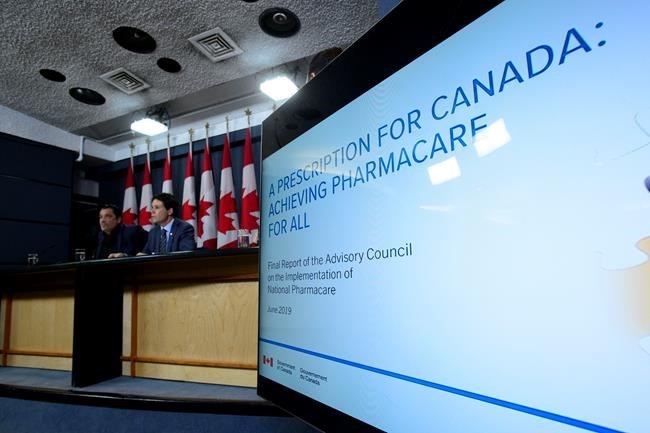
Dr. Eric Hoskins, Chair of the Advisory Council on the Implementation of National Pharmacare, is accompanied by Vincent Dumez, Member of the Advisory Council on the Implementation of National Pharmacare, during a press conference at the National Press Theatre in Ottawa on Wednesday, June 12, 2019. THE CANADIAN PRESS/Sean Kilpatrick
Republished June 12, 2019 - 12:27 PM
Original Publication Date June 12, 2019 - 11:51 AM
TORONTO - A government national pharmacare plan could leave millions of people at risk of losing access to certain drugs, industry associations warn, while an analyst says the move may also take a bite out of profits for insurers.
The industry comments came after an expert panel on Wednesday recommended that Canada should have a single-payer national pharmacare plan to cover every Canadian.
The advisory council, tasked by the federal government to look into the issue, called on Ottawa to work with the provinces and territories to create a national plan to replace the current patchwork of private and public prescription drug plans and save taxpayers an estimated $5-billion annually.
The Canadian Life and Health Insurance Association said Wednesday that millions of people could risk losing access to certain drugs under even the most comprehensive government-run pharmacare plan.
The industry association noted that private workplace health-benefit plans provide thousands of pharmaceuticals not provided by public plans and an estimated 7.7 million Canadians could risk losing access to drugs for conditions such as cancer, depression and diabetes.
“We believe there is an achievable and affordable path forward that ensures all Canadians are able to access to the medications they need without putting at risk what’s working today,” said the CLHIA's president and chief executive Stephen Frank in a statement.
“In our view, government plans and insurer-based plans should co-operate to negotiate lower drug prices for all Canadians."
Innovative Medicines Canada, which represents Canadian pharmaceutical industry players, said the recommendations put forward by the advisory council have the potential to improve access to medicine for those who are uninsured or underinsured.
However, it added that "the continued existence of the private market for drug coverage is critical to help to ensure that patients' standard of care is not disrupted if their medications are not listed" on a national list of prescription drugs, known as a formulary.
The advisory council on Wednesday recommended a new drug agency that would be responsible for developing a formulary, starting with common or so-called essential medicines by Jan. 1, 2022.
Meanwhile, National Bank of Canada Financial Markets analyst Gabriel Dechaine said a government-funded pharmacare program would displace private insurance plans offering prescription drug benefits, and eat into insurers' profits.
"The Advisory Council's report has indicated that private insurers could provide coverage for co-payments, as well as coverage for drugs that are not on the national list," he said in a note to clients. "In our view, a system that requires the private sector to 'adapt their business models to the new reality' implies a much smaller business for the lifecos."
News from © The Canadian Press, 2019